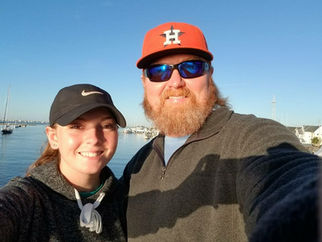Re-evaluation and Reflection
Reflection is a significant factor in growth and development. Not only does it promote our growth and development, but also benefits our understanding of situations or behaviors subsequently. The knowledge that is gained through reflection is then applied in a way that allows one to make an informed decision or to maneuver through similar predicaments in the future. When someone reflects on their past, it allows them to comprehend the events from another perspective that increases the amount of insight for specific situations. Throughout history, reevaluation and adjustment have been crucial. As humans, we analyze the past, identify the problems, work to understand those problems, and create solutions. Without examining our history, we (as a species) would not survive. We would continue to repeat the same mistake, expecting different results. This is how the human race has managed to survive thus far. In my personal experience, I have used reevaluation as a technique to understand my past and apply that understanding in my academics and personal life. Re-evaluating experiences I had with others that had suffered trauma through an academic lens has provided me with various perspectives and allowed me to respond to their trauma and behaviors in an appropriate manner. Reevaluation has benefitted my growth as an individual as well as a student. I use prior experiences and interests to determine the courses that would answer questions about the past and provide solutions for problems that I have faced. In my personal life, I have been familiarized with various aspects of trauma. The psychological aspects of trauma served as my inspiration to further my knowledge about mental disorders. While doing so, I realized the impact of the trauma in the lives of friends and family members. I was able to monitor their behaviors and draw conclusions as to what was possibly causing them to behave the way that they do.
My personal experiences with trauma sparked my initial interest in the effects it can have on the victim and people close to the victim. While being surrounded by veterans and active-duty military, I observed shifting behaviors, such as experiencing random tension in busy areas or becoming easily stressed, but never wholly understood what caused the changes. As a child, I thought they may have been grumpy or simply had a bad day. However, after being informed of my father's mental health, I realized that his behaviors were not caused by being grumpy, nor having a bad day. They were caused by the multiple mental obstacles he struggled with and continues to struggle with, as a result of past experiences.
After learning about my father’s health, my interest in the effects of trauma began to escalate. When assigned an essay in any course, I chose to write about traumatic brain injuries and the long-lasting impacts they could potentially have. However, after a while I expanded my interest and decided to research the psychological effects of trauma, specifically trauma leading to suicide in the veteran community. In the fall of 2019, I took the English 102 Rhetoric and Composition course that required a ten page paper to be written. We were given the option to choose a topic that we desired to
research, so I chose one that I could personally relate to. The paper was centered around the causes of Veteran suicide, and led me to understand mental health on a deeper level. Generally, the trauma experienced leads to post-traumatic stress disorder (PTSD), anxiety, depression, loneliness or lack of belonging, and suicidal ideation. Through research on these mental health disorders I realized that the mood swings and anxiousness were possibly due to underlying problems that had not been evaluated. The stress, anxiousness, and anger were not caused by a physical event, rather they were caused by the mental replay of events. Veterans tend to repeat past experiences in their mind, which in turn makes them feel as if they are reliving it. They lack control over their emotions in regards to PTSD, but it is not something that goes away after the event is over. As a kid, I was not fully aware of the extent of my father's health in reference to his PTSD, anxiety, and depression. However, after conducting research for the paper, I was able to reevaluate certain scenarios and make sense of his changing demeanors and behaviors.
All of the interactions and behavioral aspects that I have noticed when being surrounded by active military personnel and veterans now make more sense. My initial interest in the effects of trauma on veterans was sparked by my past experiences, and now is influencing my academic decisions in a sort of feedback loop. As I grew older, I wanted to know more about my father’s and friends’ conditions. As a result, I chose the topic of Veteran Suicide in Professor Randall Ivey’s Rhetoric and Composition course to understand the things that they are attempting to deal with. We learned how to properly conduct research within the classroom and used those techniques when writing our essays. Although I had prior knowledge of this topic, I was required to include hard evidence for the most prevalent causes of suicide in veterans. The information within the USC database was helpful; however, I needed more extensive information that the databases did not contain. Therefore, I went to the Spartanburg County Library to continue my research. The library had a large variety of books pertaining to the mental health of veterans that I was able to use. Many of the books were written by veterans that suffered with the same mental obstacles that most others struggle with, as well. From my research, I learned that for Veterans, it was the traumatic experiences that left them feeling burdensome, lonely, angry, depressed, and anxious. The coping mechanisms most commonly used are prescription drugs, therapy, alcohol, and drugs in general. These coping mechanisms are composed of healthy and unhealthy techniques. The lack of effectiveness in the most frequently used coping mechanisms generally leads to suicidal ideation as well as suicide. As I wrote the paper, I reflected on my encounters with various people throughout my life and I started reevaluating my interactions with them. However, I discovered that one factor that consistently decreased the risk of suicide was social support. My research pointed out that veterans with PTSD tend to be more willing to share emotions or thoughts with someone that understands their situation and can relate to what happened. The relationship becomes stronger when it is built upon relatability. The veteran no longer has to worry about judgement or shame because there is someone for them to discuss their experiences with. By revisiting this paper and topic for the e-portfolio, I was inspired to base my Leadership section on this question of support and relatability.
My father served in the United States Marine Corps for 20 years. While enlisted, my father was involved in the Field Radio Communication, Crash, Fire, and Rescue, Data Communication as well as the Safety and Environmental units. He sustained several injuries during his many deployments. While involved with the Crash, Fire, and Rescue unit, he responded to multiple plane crashes and fires. His crew was the first to respond to the crashes. One specific incident that he still has nightmares about was a plane crash in Okinawa. I was around three years old when I was riding with my parents and the plane went down. My father watched it fall and sped to the scene. The people in the jet did not make it, so my father helped with the bodies. The sight and smell of the burning flesh still haunts him to this day. In addition to the traumatic experiences on home territory, deployments he went on were proven to be detrimental as well. While deployed to Afghanistan, there were rockets and missiles being fired on and around the base to which he was assigned. As a result of the high stress environments, he developed PTSD early on in his career. Although the injuries he sustained occurred years earlier, they still impact his daily life, even now. Most days, he is himself; he laughs and jokes around after getting home from work. However, there are some days that he seems to be stressed and anxious. On those days, he is quicker to argue or get aggravated.
In addition to dealing with my father’s PTSD, I have also been witness to several of my friends’ issues with the condition. While residing in Jacksonville, North Carolina, a city with numerous military bases, I met several veterans and active duty military personnel. They all had varying experiences in the military. One of my friends from home is currently active duty in the marine corps and maintains a second job as a bartender. While at the bar, he is outgoing and performs a contented identity. However, the change in his demeanor is apparent when discussing his military tours with friends. He becomes reserved and seems to be reliving the trauma in his mind. He will not talk about his experiences with anybody outside of his circle of friends. While discussing his deployments, he conveys a sense of hopelessness and anger, especially as it relates to the possibility of getting help.
Another friend from home is a veteran. He served four years in the military and was deployed multiple times. During his enlistment, he experienced a variety of traumatic events. He does not mention to very many people that he was a marine because he does not want to be reminded of that time in his life. He chooses to cope with his PTSD, anxiety, and depression with the use of drugs and alcohol. After the research I conducted for my paper, I realized that their change in demeanor is induced by the fact that they are reliving particular events every time they discuss their time in the military. As a result, I began to sympathize with their situation. They feel as though it is pointless to discuss their trauma with anyone; therefore, they are unable to work through their psychological obstacles. Without reevaluation, it is nearly impossible to overcome the struggles that they are experiencing. The nightmares and emotions attached to the event will continue to haunt them, unless it is tended to properly using healthy coping mechanisms.
With all of the information I have gained through my research for the paper, I now have a greater understanding of PTSD and the
struggles that many veterans and active duty military face. As I reflect back on my childhood, what I interpreted as a bad mood,
could very well have been the manifestation of trauma. Now, I understand that, in regards to PTSD, there are good days and there
are bad days. Some days, life returns to normal, while others leave the person replaying vivid memories in their mind. Oftentimes,
they continue to visualize what they saw which makes it difficult to forget. Their mind is forcing them to relive the situation that got them into a complicated situation. However, reevaluation of those experiences in a healthy manner could provide a sense of peace once the trauma is addressed. In return, I sympathize with the situations that they find themselves in. Prior to having the knowledge that I do now, I misjudged their changes in demeanor. Now my goal is to help them in every way possible. Sometimes, the best thing to do is be there and be present. Listening to what they are saying without having an opinion and simply letting them know that you care allows them to do their own re-evaluation and self reflection. Understanding the mental obstacles they are struggling with allows them to discuss things with someone who knows what they are going through. Had I not had the ability to do the research on veteran suicide, I would not have been able to completely understand experiences and interactions from my past. Reevaluating and reflecting on these interactions have helped me interpret behaviors in a way that has allowed me to be more compassionate and empathetic. I believe that through guided reflection, similar to what I have done through this e-portfolio, veterans can make better sense of their past trauma in an effort to heal.
Conducting research involving sexual assault is significant because it is considered a traumatic experience. Analyzing responses to to sexual assault provides us with information regarding the persons thought processes when faced with traumatic scenarios. Responses to someone else’s trauma is influenced by the amount of experience someone has with trauma. Past experiences allow people to better understand and relate to others. My previous experience of living in a military town has allowed me to view trauma from another perspective. It has taught me to empathize with people and the situations they may be in. Experiencing traumatic events, or being close to someone who experienced trauma has been beneficial to my research now. I am able to analyze the psychological aspects of responding to trauma as well as personally respond in a socially acceptable manner.









